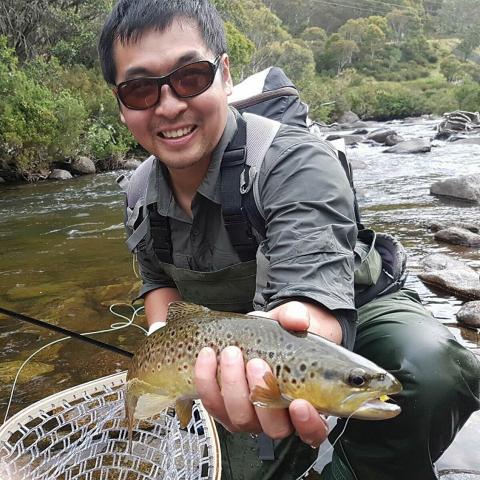The diversity of recreational fishers adds to the complex task of defining the recfishing experience, and the challenge of identifying research priorities
By Catherine Norwood

Photo: Patrice Gilles
Recreational fishing representatives from around the country came together in a workshop last November to mark the beginning of an 18-month process to develop the FRDC’s next Recfishing Research, Development and Extension (RD&E) Plan.
State and national peak recreational fishing bodies, the tackle sector, fisheries management and research, and recreational fishing media were all represented in the one-day workshop, held in Melbourne. The event was hosted by the FRDC’s Recfishing Research subprogram advisory committee, and chaired by natural resource and fisheries management expert Peter Neville.
Executive officer for the FRDC’s Recfishing Research program Owen Li says several of the issues identified at the workshop gave existing research priorities a more specific focus. Among these were initiatives to optimise recreational fishing experiences, positively influence public perceptions, and build the skills of sector leaders.
CEO of Recfishwest Andrew Rowland spoke on the role of recreational fishing peak bodies in “protecting, promoting and developing sustainable, accessible, enjoyable and safe fishing for the community”.
Participants discussed how this might mean different things to different people; for example, catching more fish, spending time outdoors, or seeing other wildlife – even when no fish were caught. They also agreed that more research was needed to identify expectations across different recreational fisheries and demographic groups.
The importance of effective communication emerged as a major theme. This ranged from how to provide information about the latest research findings and best practice to fishers, to the gathering of ideas and concerns from fishers themselves.
Colin Tannahill, managing director of Shimano Australia and president of the Australian Fishing Trade Association, highlighted the role of tackle shops as places for exchanging information, not just purchasing fishing gear.
Other ideas included the strategic use of social media, investing in selected recreational fishers as ‘influencers’, and incorporating ongoing communication with stakeholders as part of research projects.
Fishing media representative Jo Starling outlined changes in the way people look for information, saying this had implications for the way research was communicated.
She said that while the aim of making fisheries science more accessible and digestible to recreational fishers remained the same, the delivery needed to change. Younger people preferred messages spread by ‘influencers’ (active participants who are not necessarily considered experts) as opposed to the authoritative ‘experts’ relied upon in the past.
Owen Li says the meeting highlighted the need to communicate more effectively with diverse recreational fishing audiences, including women and migrants, and to better represent the recreational sector to the general public.
Delegates also identified a need to invest in:
- support for habitat recovery and enhancement;
- improved knowledge translation and use;
- understanding and reducing depredation of catch (for example, sharks and seals eating hooked and released fish); and
- understanding fish welfare, such as the impacts of hooking, and how or whether fish experience pain.
Owen Li says consultation will continue as the FRDC’s 2020–25 Recfishing RD&E Plan is developed. He expects projects from a finalised list of research priorities aligning with existing priorities may be put to tender later in 2019.
OWEN LI, FRDC EXECUTIVE OFFICER RECFISHING RESEARCH SUB-PROGRAM
Owen Li pictured with a Brown Trout (Salmo trutta), officially took on the role of executive officer for the FRDC’s Recfishing Research program in September 2018.
He has a Bachelor of Marine Biology and a PhD in environmental social sciences from James Cook University. His PhD thesis looked at ways to improve communications between government, researchers, natural resource managers, and recreational and commercial fishers.
Owen Li is based at the University of Wollongong, where he is also the communications coordinator on an international aid project involving several South Pacific countries. He has previously worked as a consultant to develop recreational fisheries communication tools; on boating safety; and on the sustainability of WA’s marron fishery.
As a recreational fisher himself, Owen Li says he is definitely a land-based angler, with a love of lure and fly-fishing. He is mostly a catch-and-release fisher, although the odd Mangrove Jack and Barramundi does end up on his dinner table.
FRDC Research Code: 2014-402
More information
Owen Li, 0413 148 222
owenl@uow.edu.au





